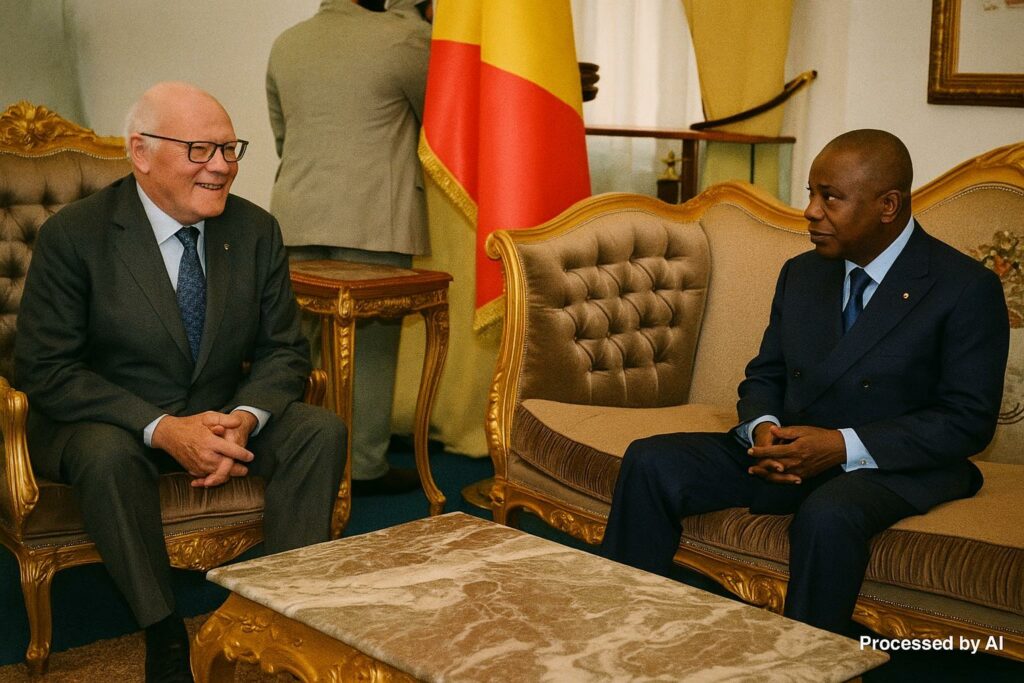A Parisian Mayor in Brazzaville Revives an Old Question
When Professor Jean Girardon, mayor of Mont-Saint-Vincent and long-time lecturer at the Sorbonne, crossed the Congo River in mid-July, his audience with Senate President Pierre Ngolo swiftly transcended protocol. “It is commendable to grant new powers; it is imperative to grant the means,” he told reporters, distilling four decades of municipal practice into one sentence that echoed across the marble halls of Parliament. The visit, formally linked to a capacity-building workshop for the Congolese Labour Party’s upper-house caucus, re-ignited a national conversation that has never quite died down since the seminal decentralisation laws of 2003 and their revisions in 2011.
Historical Layers of a ‘Young Democracy’
Congo-Brazzaville’s decentralisation journey is often described in policy circles as a quest to reconcile territorial cohesion with administrative efficiency. The 2002 Constitution, adopted in the aftermath of civil strife, enshrined the principle of elected local authorities. Subsequent organic statutes led to the first wave of competence transfers in education, health and basic infrastructure. Multilateral partners such as the World Bank underscore that, since 2015, more than sixty percent of primary-school maintenance budgets are theoretically channelled through communes (World Bank 2022). Yet auditors from the African Development Bank note that actual disbursement rates fluctuate between twenty-five and forty percent, a gap that feeds popular frustration even when intentions are laudable (AfDB 2020).
The Fiscal Equation Still to Be Solved
At the heart of the debate lies an arithmetic dilemma. Local tax revenue represents barely four percent of total fiscal receipts, according to the Ministry of Territorial Administration’s 2023 white paper. Oil royalties—the backbone of national income—remain centralised in order to protect macro-economic stability, a position defended by the Ministry of Finance with understandable vigour during recent IMF consultations (IMF Staff Report 2023). The government nevertheless channels annual equalisation grants to communes and departments, indexed to population and infrastructure deficits. Critics argue that these transfers are uneven and often delayed; officials reply that volatility in global energy markets complicates predictable cash-flow management. Both propositions can be simultaneously true, leaving mayors with elaborate mandates yet limited ledgers.
Why the Status of Local Elected Officials Matters
Professor Girardon chose to emphasise another, less visible dimension: the statute of local representatives. In his words, it is “both quantitative, because a fair stipend invites broader candidacies, and qualitative, because an ethical framework deters conflicts of interest.” His remarks resonate with findings from the UN Development Programme, which observes that generous but transparent allowances correlate with lower absenteeism in municipal councils across Central Africa (UNDP 2021). The Congolese Senate is currently examining amendments that would clarify incompatibilities between mayoral duties and private-sector engagements, a reform praised by civil-society groups for its potential to bolster public trust.
Benchmarking Without Copy-Paste
Congo’s decision-makers have long cultivated policy exchanges abroad, ranging from South-South seminars with Rwanda on digital civil registries to North-South dialogues such as the one animated by Girardon. Diplomats in Brazzaville quietly point out that benchmarking must remain selective: the fiscal decentralisation model of France, with its dense tax base, may not travel wholesale to a resource-rich yet demographically sparse Congo. Nevertheless, shared experiences on inter-municipal tourism strategies—where communes and departments co-finance signage, security and marketing—could be replicated with minimal legal engineering and high visibility dividends.
Balancing Prudence and Ambition
President Denis Sassou Nguesso’s most recent State of the Nation address underscored a commitment to “territorial equity through measured devolution,” signalling that fiscal generosity will track broader macro-stability goals. International observers largely concur that such prudence helped Congo exit a prolonged recession in 2021. Yet the same analysts caution that delayed investment in local infrastructure may incur social costs over time. The policy window, therefore, appears narrow but navigable. Should forthcoming petroleum revenues—buoyed by an uptick in global demand—be partially earmarked for municipal capital expenditure, the decentralisation architecture painstakingly built over two decades could graduate from legal construct to lived reality.
A Dialogue That Outlives a Diplomatic Visit
As Professor Girardon boarded his return flight to Paris, the Senate began drafting its autumn agenda, with fiscal transfers and the statute of elected officials topping the list. Stakeholders from the mayors’ association to the Chamber of Commerce welcome the renewed sense of urgency. For the moment, the conundrum endures: how to maintain national cohesion, honour international fiscal commitments and still equip local leaders with the resources that transform competence into service delivery. The answer, many concede, will lie not in a single reform but in the patient calibration of revenue-sharing formulas, administrative oversight and political will—a balancing act familiar to every state that calls itself a republic.

